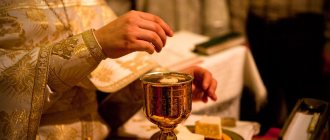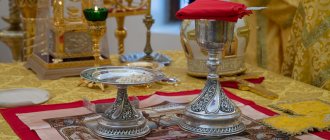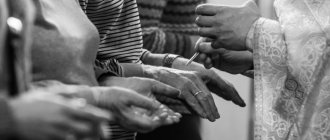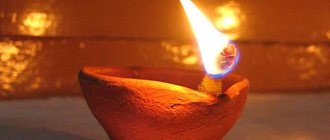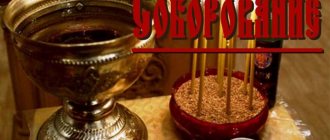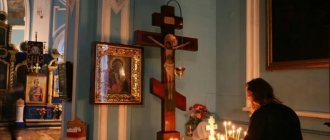What is unction in Orthodoxy, why is it necessary to undergo unction?
Unction in church
Unction, or also called unction, is a sacrament. There are 7 sacraments in the Orthodox Church, a believer tries to observe them. These sacraments were established and observed by Christ himself with his disciples, and he commanded us to do so. These are the sacraments:
- Sacrament of Baptism . We encounter it in infancy or as adults, when a person is baptized in the church. It looks like immersing or pouring water on the baby 3 times and saying a prayer.
- Sacrament of Confirmation . The priest in the church uses a brush to anoint with church oil in the form of a cross - the forehead, chest, arms, legs of a newly baptized person, usually an infant.
- Sacrament of Marriage . We can observe it during the wedding of the newlyweds in the church, and the placing of crowns on the heads of the bride and groom.
- Sacrament of Communion . Holy Communion in the form of the Body and Blood of Christ is given to us by the priest with words of prayer in church after we confess our sins. As a sign of remission of sins, we receive a spoonful of Holy Communion, then wash it down with water.
- Sacrament of Unction . If it is God’s will, then after unction a seriously ill person can be healed. During this sacrament, seven prayers are read, usually by several clergy. After each prayer, the priest mentions the name of the sick person and anoints his forehead, chest and hands with blessed oil, and after the last prayer the priest places the Gospel on the sick person’s head and asks God for forgiveness of his sins.
- Sacrament of Penance . We come to church to the priest and want to confess our sins to him. In response, the priest orders us to adhere to a short fast (not to eat meat, eggs or dairy), not to sin, and to read prayers every day. After a certain time, we come to church again, tell the priest about the sins we have committed, deeply regretting it. If the priest undertakes to forgive you your sins, he reads 2 prayers, reconciling and asking for mercy on you before God.
- Sacrament of the Priesthood . This Sacrament is intended for those who have decided to devote themselves to God - clergy upon receiving the rank.
According to church ministers, during unction, a person is absolved of those sins that he does not realize are sins or has forgotten about them, and does not mention in confession. Unction can be carried out both for seriously ill people at home and for sick people who can come to church. Priests refuse to offer unction only to unconscious people and violent patients with mental illness.
Differences from Confirmation and Anointing
The Sacrament of Confirmation, like the Blessing of Anointing, belongs to the seven Sacraments of the Church. It differs in the number of implementations - it is performed once (except for royal persons), it is implemented by anointing certain parts of the body of the person who has accepted the ritual with the Holy Myrrh. According to the established tradition of the first centuries, the Holy Spirit was transmitted to the newly baptized through the laying on of hands by the apostles. But over time, the ritual began to be performed through anointing with aromatic myrrh, according to the Old Testament.
Anointing with Anointing does not belong to the seven sacred Sacraments; it is performed in the temple during Matins at the polyeleos. This action symbolizes the call for blessing, love and mercy of God. The ceremony is performed on everyone, even on people who have not received Holy Baptism.
When does the unction take place in the church?
Unction in the church is prescribed by the priest, mainly in Lent.
There are 2 types of unction:
- At home for a sick person
- In church - for everyone who wants to receive unction and can come to church
In a church, a priest can schedule unction during Lent (before Easter) or during Lent (before Christmas). You can take unction once a year if a person feels a great need to cleanse the soul or is seriously ill. Before unction, it is advisable to confess your sins.
The unction must be carried out by 7 priests, but if there are not so many, and even one, if he conducts the unction, it is considered effective.
Sick and healthy
There is an almost comical misconception associated with the sacrament of Unction.
If today a person with little church faith (but familiar with Russian literature) is asked to perform unction or administer unction to sick relatives, he may recoil in embarrassed fear. This is understandable: back in the 19th century, the words “have already received unction” meant “ends.” At that time, unction was given mainly to the hopelessly sick or dying - let us remember the old man Count Bezukhov from Tolstoy’s novel “War and Peace.”
But the original and main purpose of Unction is healing from illness. However, a person is sick not only with his body, but also with his soul, and many diseases of the body are consequences of illness of the soul. The soul is sick from sins (or their consequences).
Therefore, the main meaning of the sacrament of Unction is that when a person is anointed with consecrated oil (oil), the grace of God is invoked for the healing or weakening of both physical and mental illnesses, as well as the remission of sins forgotten without malicious intent.
“The power of the Sacrament of Unction lies in the fact that it especially forgives sins that are forgotten due to human weakness, and after the forgiveness of sins, bodily health is also granted, if God’s will for it,” wrote St. Ambrose Optinsky .
Therefore, for healthy people, especially during Great Lent - a time of special struggle against sin - Unction helps to recover in soul, gives strength not to lose heart and fight for their salvation. Hence the tradition of performing Unction during Great Lent in order to meet Easter with a “pure heart.”
How does unction take place in church, how to behave: rules
During unction, there should be a large vessel with grain on the table, a small vessel with oil on it, and 7 candles lit.
Believers who are 16 years old can receive unction , but you can come to the unction from the age of 8 , and for small children under 7 years old, God is all sins releases without unction.
People have different opinions about unction: some believe that such a sacrament will definitely help to recover, and when they are a little sick, they go to church to receive unction. Other people, even when they are seriously ill, are afraid of the sacrament of unction and refuse it. But there is no need to be afraid, because priests perform unction not for death, but for life.
On the day when general unction is appointed in the church, a table with a cross and the Gospel is set up, as well as a vessel with wheat, on which is another smaller vessel with oil and wine. 7 sticks with cotton wool are placed in the wheat - for anointing. There are 7 candles lit on the same table. Believers stand around, wishing to receive unction with lighted candles in their hands, listen carefully to the words of the prayer, and wait for anointing 7 times. Between anointings, priests read prayers. Anointings are performed in the form of a cross on the following parts of the body (they must be freed from clothing):
- Forehead
- Nostrils on both sides
- Both cheeks
- Lips
- Both hands
- Small area below the neck
After the seventh anointing on the heads of the assembled people, the priests lower the Gospel with the text down, saying a prayer ending with the words “Lord have mercy.” After this, the congregants kiss the Gospel, and deeply believe that all sins have been forgiven by God, and they can continue to live with new strength.
If you are late for the unction for reasons beyond your control, and if at least one anointing was missed, the sacrament is considered effective, but you still need to try to arrive on time.
Unction in church: what should you take with you?
You should have a candle with you, 2 handkerchiefs, your head must be covered with a scarf or something else.
A few days before the unction, priests advise you to undergo the Sacrament of Confession. If, when you are getting ready to go to unction, you don’t know what to take with you, then here are the tips of people who have undergone unction. The following is needed :
- Take money to buy a candle and leave a donation to the temple
- Take 2 new handkerchiefs: one to hold a candle, the other to blot your face, hands and neck from the oil (you can’t throw away the handkerchief, you need to burn it at home or wash it)
- There is no need to wear a sweater with a standing collar; the neck should be free (the priest applies oil in the place of the cleavage)
- Come to church service on time and defend it
- Unction
- And receive Holy Communion
History of the sacrament
Initially, the Sacrament was created, like the anointing with myrrh, through the laying on of the hands of the Accomplisher. In the apostolic age, the laying on of hands for healing was replaced by anointing with oil. Blessing of oil should not be perceived as a healing remedy for all diseases. The apostles did not establish anything on their own, but taught the laws of God.
They clearly defined the rite of the Blessing of Anointing:
- performance of a certain rite by a clergyman;
- prayer;
- anointing
The Blessing of Anointing passed into the Russian Orthodox Church from Byzantine religious traditions and is performed almost pristinely in modern times.
Unction in church: how long does it last?
Unction lasts a long time, from 2 to 6 hours.
Unction lasts a long time, from 2 hours, provided that 1-2 people will perform unction, but if there are many people who want to receive unction, then more time is needed. During the passage of this Sacrament, the priests read the following prayers:
- Preparatory
- Canon
- 7 excerpts from the Gospel and the Apostle, New Testament
- Litany (appeal to God in prayer)
- Blessing of oil and prayer
- Anointing the forehead, hands and chest with oil, and prayer
If the consecrated oil (vegetable oil) remains, it can be taken home by the congregation, and then used for anointing and added to food. Oil is also used when burying a deceased person (before closing the coffin lid, oil is poured into the coffin and then closed).
From time immemorial
Photo by Yulia Makoveychuk
The Sacrament of Anointing , like other sacraments, is of evangelical origin; it was established by Christ Himself. As we learn from the Gospel of Mark (chapter 6), “having called the twelve, Christ began to send them out two by two, giving them power over unclean spirits. They went and preached repentance, cast out many demons, and anointed and healed many sick people.” According to this testimony, even before the Savior’s suffering at Calvary, such a sacred rite existed; it provided help to the sick both physically and spiritually. Then we find information about the Sacrament of Anointing in the letter of the holy Apostle James (chapter 5, verses 14-15). “Is any of you sick, let him call the elders of the Church, and let them pray over him, anointing him with oil in the name of the Lord. And the prayer of faith will heal the sick person, and the Lord will raise him up; and if he has committed sins, they will be forgiven him.”
Unction for seriously ill patients at home: how to prepare for it?
Unction can be ordered at home.
Unction is necessary for a person if he is lying in bed and has difficulty getting up. With this Sacrament, a person will get rid of unconscious sins. If a priest comes to your home, a seriously ill person can, along with unction, repent of his sins and receive communion. Other family members can gather together with the sick person if they see the need for it.
A sick person does not particularly need to prepare for unction; it is important to repent of the sins that you have committed earlier and read prayers as best you can (you can in bed).
When the priest arrives to administer unction to the sick, someone from the family should prepare:
- Clean and empty table
- Chair
- Olive oil
- Full kettle of boiling water
How much does unction cost?
Unction costs little money, so donate to the church.
If the unction takes place in a church, there are prices for each Sacrament, you can find out about this in the church or church shop, usually churches have them now.
If the unction takes place at home, and you don’t know how much money to give for the unction, repentance and communion, then you can ask the priest. Each family has its own capabilities, and the priest sees this.
If unction is necessary, and a sick person wants to undergo unction, but he does not have money, then he must immediately say so, and the priest will perform the Sacrament of Unction for free.
About the cost
As a rule, the church does not name the specific cost of the procedure. Priests usually answer the question about the cost in the spirit of “how much will you give.” It is best to ask the clergyman how much they usually give him for performing the sacrament, and pay a comparable amount if you have such an opportunity.
If you have nothing to pay, the priest will perform the ceremony for free. However, you should not abuse this, if you have something to pay, it is better to pay - this will be a sign of respect for the clergyman and the church. And the Lord loves it when people treat each other with respect.
What does it mean if you feel sick during unction?
After unction you can feel bad for various reasons.
The question of why you can feel bad after unction was asked by believers to a minister of one Orthodox church. He replied that there could be several reasons:
- Physical state of human health not related to unction
- Feelings about Unction
- For a person who has not repented of his sins, unction may not bring relief, but rather suffering.
Also, in the practice of clergy and believers, there were cases when a person did not adhere to one faith, but rushed into one faith, then into another, and returning back to his previous faith, he felt bad in the temple.
About myths and prejudices: is it possible to wash and the like?
Not only is the Sacrament of Anointing itself surrounded by a mass of “misunderstandings,” but there are no less of them around how to behave after it. They can tell you in confidence that you cannot:
- wash and go to the bathhouse;
- eat meat products, and never;
- have a marital relationship;
- take medication;
- that you need to fast, except Wednesday and Friday, also on Monday.
On this occasion, I would like to give a short quote from the First Epistle of the Apostle Paul to Timothy: “Stop worthless women’s fables,” because all these prejudices cannot be called anything other than “worthless women’s fables.”
Whose life changed after unction: reviews
There are many cases of healing of the sick after unction.
There are cases when after unction it became easier or all the sores went away.
Here's one of them. The story is told by priest Sergius Kruglov, Minusinsk . In March, I had to work at a construction site in a neighboring village. I walked home, the snow was melting, there were puddles all around, my feet got wet. And after some time, doctors discovered that I had double pneumonia. Then I spent a long time in the local hospital, but they discharged me with not very good results: lung damage in the form of black spots, and constant monitoring by a phthisiatrician. In the fall, I received unction, and after a while I visited the doctor as planned, with fluorography. The doctor turned my picture over in her hands for a long time and said in surprise that there was no illness, everything had gone away.
Nina Alexandrovna, living near the Optina Pustyn monastery . We moved with our sick son and old mother from Moscow to a village house not far from Optina Pustyn. There is a lot of work in the village, but I did it all alone, and I broke my back. At the hospital they said that I needed an operation, but how could I leave my family alone at home? I told the elder from the monastery about my troubles, and he advised me to take unction. I barely reached the church, and there the newly minted hieromonks conducted the service for six hours. By the end of the unction she began to doze off, but she persevered. I left the temple, went home, the fatigue and pain disappeared as if by hand. At home I started watering the garden with buckets, sat down to rest, and then I only remembered that my back used to hurt.
So, from this article we learned that unction can help us endure physical and mental pain more easily.
Evidence of healings and deaths after the sacrament
In every parish, perhaps, there is more than one evidence of the impact of the holy sacrament on the sick who were exposed to it. And if we were to write them all down - both about recovery and about deterioration of the condition - it would turn out to be a very entertaining volume.
Lyubov, 61 years old
The sacrament can help to recover from illness.
“In the fall, a disaster occurred in my family: my husband slipped while getting out of the bath, fell and broke his head.
He is a heavy man, and the blow came with all its might. In addition to the fractured skull, of course, there was also a severe concussion.
The saddest thing is that he once had a traumatic brain injury in the same place in his youth... Then everything was like in a nightmare: a complex multi-hour operation, a month in intensive care, feeding through a straw and a disappointing doctor’s verdict: he will be bedridden.
They were discharged home. A day later, the condition worsened, convulsions began, and the ambulance took me back to neurosurgery. The whole parish prayed for the seriously ill Leonid at every service.
When he was brought home again, our priest and I decided to offer unction to Lenya, even though he, who had been baptized, was far from the church. I thought like this: if I was destined to die, then at least I would receive the last Christian parting words. And if the Lord extends his years, then, you see, my good-for-nothing will be able to change his life.
Leonid spoke with great difficulty, but with the help of his father he repented of his sins. And then they performed the Sacrament of Anointing on him and gave him communion. And he literally fell asleep immediately...
I can’t say that my husband recovered instantly; we still lived with diapers for about a month and a half. Then he slowly began to get out of bed and walk to the toilet - first with my help, then on his own, along the wall.
I won’t describe all the stages, but now it’s spring, and he carefully goes outside with a stick. At home he tries to read, although he quickly gets tired from the tension. He lost a lot of weight, some say beyond recognition. But - alive!
Nadezhda, 42 years old
“ I will never forget how hard my aunt died!” She had cancer. She had her first operation many years ago, everything was quite successful, and then there were metastases in the lungs. I had to look after her. She lived alone. The only son is far away.
It was more comfortable for her to sit than to lie down—it seemed like she could breathe easier. And then it became so scary when she began to choke in front of her eyes, and then she stopped talking altogether - she just showed everything with signs. I suffered beyond words!
Her friends often called and asked how to help. How can you help here? And one of them, knowing that the aunt was a believer, recommended that she be given unction. I called the priest, explained the situation, and he came literally the next day and carried out everything as it should.
And right before Aunt Valya’s eyes, her breathing began to even out, and the anguish and panic disappeared from her eyes. She took communion, and literally an hour after that she took a deep, deep breath, smiled and walked away. It was as if the Unction helped her to end her torment, alleviate her suffering, and gave her the opportunity to move into eternity in peace.
Alexey, 56 years old
You can call the priest to a sick person’s home or hospital.
— My old mother has terrible polyarthritis - all her joints and joints hurt mercilessly. She tried everything! We bought all sorts of medicines! In short, not life, but torture.
We live not far from the church, and my mother’s friend goes to all the services. One day he comes and says that during Lent they will be serving unction in the church, maybe, they say, you, Masha, can somehow get there? She told me what to do.
Well, trying is not torture, and I took my mother there with two sticks - there was no other way - to church on the appointed day.
She was there for two hours. I thought she’d get home on her own after such and such. Nothing helped her. Just as she suffered pain, she still suffers. I would even say that after the unction it got worse. Maybe we did something wrong?
I would like to comment on the author’s last question. Everyone who begins the Sacrament of Anointing must really realize that recovery is a free gift from God, and not an indispensable result of even the most impressive sacred rites.
Many people expect a miracle from the ritual, forgetting that first of all, when embarking on such a sacrament, they should analyze their life, remember all the unseemly actions that fall into the category of sins, realize them and repent - cleanse themselves of them. When going to the Unction, they perceive it as something like a medical procedure, and the thought of the spiritual aspect of this sacrament does not even arise in them.

